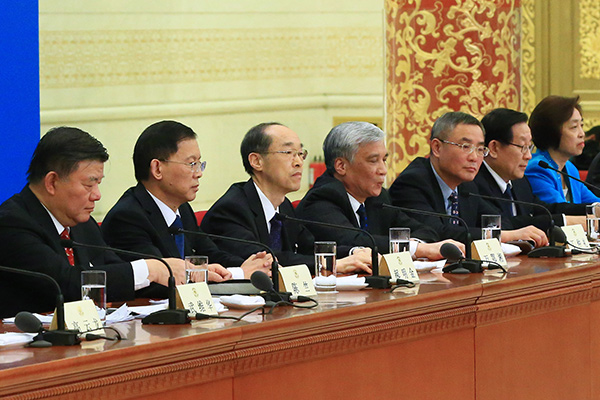
Leaders from non-Communist parties and the All-China Federation of Industry and Commerce attend a news conference during the first session of the 13th National Committee of the Chinese People’s Political Consultative Conference in Beijing on March 6.[Photo/Xinhua]
Leaders of non-Communist parties said on March 6 that China’s system of multiparty cooperation and political consultation creates a new party system and provides “China’s solution” and “China’s wisdom” for the development of world party politics.
“It’s an innovation in political party systems that is different from one-party rule or the competitive system of multiple political parties in the West,” Ding Zhongli, chairman of the Central Committee of the China Democratic League, said at a news conference on the sidelines of the ongoing annual two sessions.
“We have a system of multiparty cooperation and political consultation, led by the Communist Party of China. Such a system fits China’s history, tradition and reality,” he said.
China now has eight non-Communist political parties that participate in State affairs under the leadership of the CPC.
The two latest cases of the exercise of such democracy were on Feb 6 and Feb 28, when the CPC Central Committee held two meetings with representatives of non-Communist parties. The Central Committee held discussions with them, hearing their opinions on its decisions and plans for deepening the reform of Party and State institutions and on the lists of candidates for State leaders and leaders of the top political advisory body.
Traditionally, the leaders of the eight non-Communist parties also become vice-chairs of the National People’s Congress Standing Committee, the top legislature, or National Committee of the Chinese People’s Political Consultative Conference, the nation’s top political advisory body.
Attending a joint panel discussion with political advisers on March 4, President Xi Jinping said such a system unites all political parties and people without party affiliation toward a common goal. That effectively prevents flaws, such as the absence of oversight in one-party rule or power rotation and harmful competition among multiple political parties, he said.
Xi, also general secretary of the CPC Central Committee, said the system pools ideas and suggestions through institutional, procedural and standardized arrangements and develops a scientific and democratic decision-making mechanism.
He said upholding the CPC leadership was not meant to do away with democracy. Instead, it aims to create a form of democracy that is broader and more effective.
Hao Mingjin, chairman of the China National Democratic Construction Association, said such a system grows from China’s soil. “It’s made in China and created in China.”
“Such a new mode of political party system and a new relationship among parties has drawn the attention of some other countries,” he said at the news conference on Tuesday. “It contributes China’s solution and China’s wisdom to the development of world party politics.”
Ding, of the China Democratic League, said most of the non-Communist parties in China were established in the 1940s, and they have had a long history of close cooperation with the CPC.
After the founding of the People’s Republic of China in 1949, many leaders of these non-Communist parties proposed to dissolve their parties, but Chairman Mao Zedong considered it necessary for those parties to exist together and supervise each other, he said.
After China’s reform and opening-up began in the late 1970s, leader Deng Xiaoping added the principle that all the parties should treat each other with all sincerity and share weal and woe, Ding explained.
Wang Xiaofan, vice-president of Shanghai University and a national political adviser, said such a system of party relations combines collective leadership and democracy, and it’s a positive contribution to the development of the political civilization of humanity.
